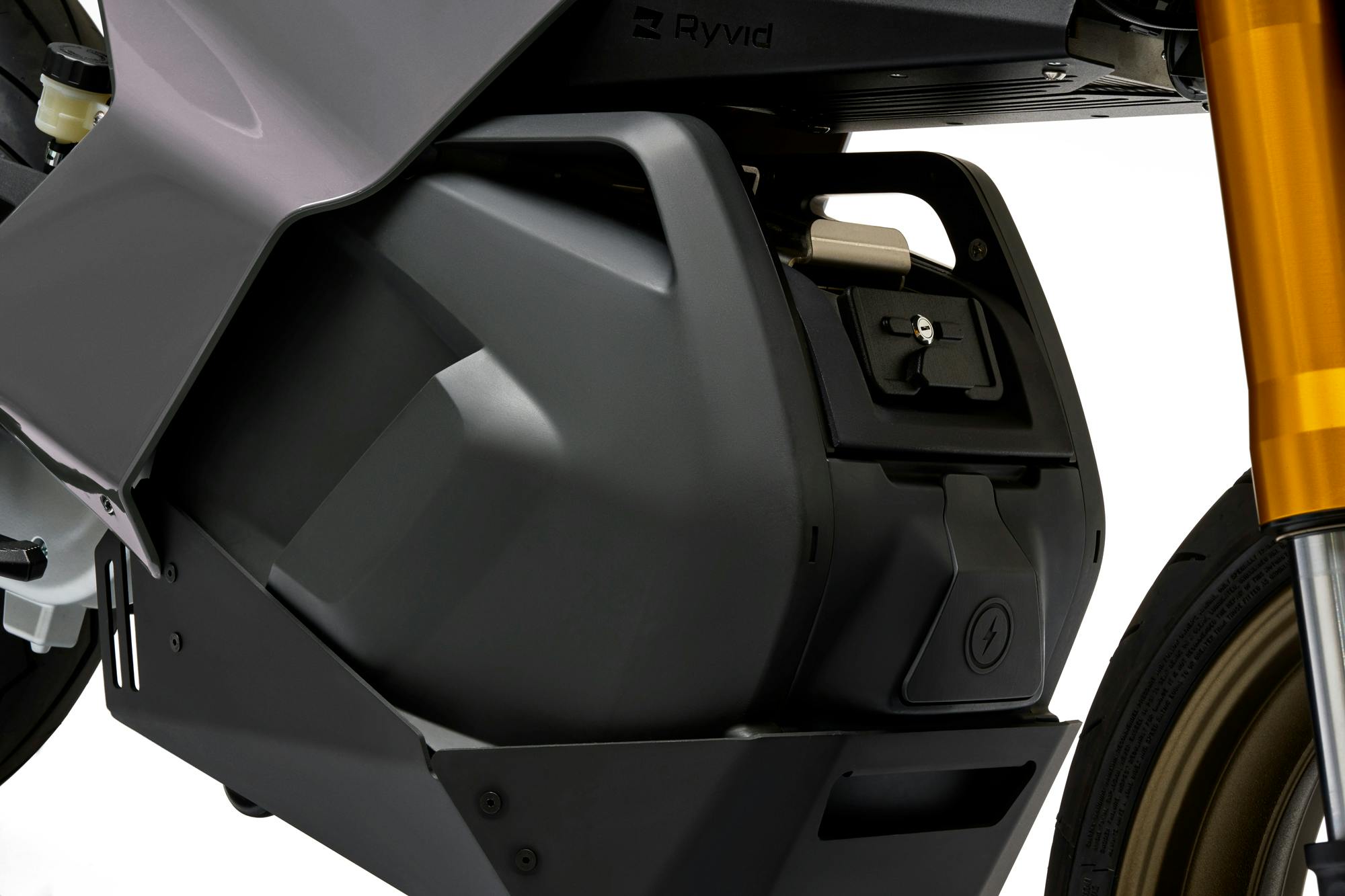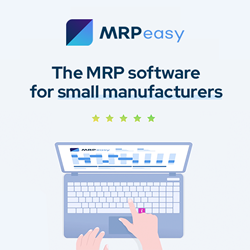Discover why this innovator in the micromobility powersport space chose Xometry to produce 50% of parts found in its flagship electric motorcycle, the Ryvid Anthem.
Ryvid’s Anthem EV Bike Races Through Production With Xometry's Horizontal Supply Chain
Case Study from | Xometry
Renewable Power. Thrilling Mobility.

Ryvid, an innovator in the emerging micro-mobility power-sport market, is set to release its first product this summer: the Ryvid Anthem. Designed by former aerospace engineers to be lightweight, ergonomic, and sustainable, this sleek new electric vehicle (EV) motorbike is built with dozens of Xometry-produced metal and plastic parts.
The Ryvid Anthem is built with the future in mind; it is a highly modular product set to adapt and grow with new innovations that will keep its fans hooked for years to come. These innovations will be augmented by Xometry’s horizontal supply chain, which gives Ryvid the manufacturing capacity to deliver production orders while maintaining the supply chain flexibility the company will need as it adapts the Anthem’s design over time.
“Ryvid is a combination of the words 'Rhythm' and 'Avid' which describe the motion and emotion behind the feeling you get while ripping around on two wheels,” explained Thad Jackson, Chief Brand Officer of Ryvid.

If you ask the team at Ryvid what makes their EV bike so special, they’ll tell you: facts alone don’t do it justice. You need to ride a Ryvid Anthem to understand what makes it special.
“The Anthem delivers that unique emotional feeling that we chase as riders," Jackson said.
“The Ryvid Anthem is lightweight, quick, and handles great,” he continued. “It's a capable urban explorer that you can use on the highway, but really excels at transforming the mundane trip to work or the grocery store into a highlight of your day.”
“Many riding enthusiasts arrive at a place where they aren't trying to prove anything, and they gravitate toward bikes that are just fun to ride regardless of displacement or rear tire size. While the Anthem works well as an entry-level bike, it's a blast to ride, which makes it a perfect way for an experienced rider to step into EV,” said Jackson.
Ryvid Starts Strong, Stays Fast, and Remains Flexible With Xometry
His background as a former aerospace designer and design consultant for several successful startups served as inspiration for the Ryvid Anthem. Tran saw the potential and need for a sustainable EV bike that could take advantage of the form and function of lightweight bonded parts typically found in aerospace vehicles. Along with Chief Technology Officer (CTO) Vinh Tran and Chief Experience Officer (CXO) Vincent Nguyen, Tran founded Ryvid, Inc. in 2021
To succeed, Ryvid would need to find a manufacturing partner to meet its ambition.
“The main benefit of [working with] Xometry is definitely speed. We had a vast network of vendors in China, which came with its own challenges. We had to manage the vendors and spent a lot of time project managing, QCing, and working through communication challenges. When we approached Xometry, we noticed right away that they gave us a lot of flexibility, especially with our mold tool. Xometry was really in that sweet spot for us. It was helpful to communicate with a partner that really knows engineering and design. The quality and speed from them were just different, which is really important for us because we needed to get the product out this year.”
Dong Tran, CEO of Ryvid
With Xometry, you can access a range of manufacturing solutions to help you develop initial prototypes, work through the initial stages of concept development, and scale up to high-volume production. Engineers, designers, and product visionaries worldwide use the Xometry Instant Quoting Engine® to quickly price parts built from manufacturing processes like CNC machining, 3D printing, sheet metal fabrication, urethane casting, and more.
Technology Dissection: How the Big Idea Was Built
Xometry produced parts can be found throughout the Ryvid Anthem, encompassing approximately 50% of its total parts.
Xometry’s sheet metal fabrication service, in particular, benefited Ryvid. “Sheet metal is the core of what we do,” said Tran. “It helped us minimize costs and time to market.”
Tran continued: “We have been relying on stainless steel, as its strength and anti-corrosion properties help us remove the need for extra finishing finish costs. In addition, sheet metal offers tons of flexibility; it makes it easy to change up your frame design without tooling costs, which is super attractive to us. As an R&D company, we don’t want to be tied down to anything. We want to be able to change that frame easily. We don’t want to have to redo things with unnecessary tooling.”
While the frame is one of the most noticeable parts of the bike, perhaps one of the most consequential part designs can be found in the bike’s spring arm. The spring arm holds the motor, motor casing, and caliper and attaches to the frame with one cross bolt.
By centralizing the complexity of the e-bike within the swing arm design, Ryvid’s design team reduced the weight of the Anthem, leading to a more efficient, well-balanced, and cost-effective product. They took advantage of Xometry’s die-casting manufacturing process to mass-produce this cornerstone part.
When speaking to the importance of the spring arm design, Jackson said, "One of the things that we wanted to do was leverage the technology where it's at and build something around that in a ground-up way. We're doing unique things, like having the motor fit within the swing arm rather than in the frame; there are just so many efficiencies there.”

He continued, “As better, more efficient, lighter, smaller, more powerful electric motors become available, we'll be able to change those out on the fly. We have almost infinite freedom going forward and can adapt to the technology as it changes.”
In addition to the sheet metal and die-cast parts, the Ryvid Anthem takes advantage of other Xometry manufacturing processes like CNC turning, which is used for hardware, metal forging, and injection molding, which is used for every plastic part on the bike. If you need a fast initial batch of plastic products as you start to scale production, consider options like our quick-turn plastic injection molding service. With this service, you can get an injection molding quote in as fast as two hours and get your domestically-made plastic parts in as few as five business days.
Xometry Liberates Your Product Development with Its Horizontal Supply Chain
Ideally, a brand should make product design decisions based on the wants and needs of its customer base rather than being guided by the limitations of internal and external shops. As Tran said, “Why add additional costs by building your own shop when people want to work?”
He continued, “We want our customers to know that we are putting a lot of effort into building a flexible manufacturing supply chain that isn’t just vertically integrated. There’s no need to vertically integrate manufacturing processes like die casting and injection molding. Why add additional costs by building your own shop when people want to work?”
The CEO expressed his hope that Ryvid’s customers would come to know it as a brand they could trust. In addition to creating jobs for workers, Ryvid is also mindful of the environment. “Sustainability is a big thing for us,” said Tran, “and we believe that EV companies need to be really efficient in how they manufacture their products.”
When it comes time to scale up your brand, consider how a horizontally integrated supply chain can help you:
Manufacture more sustainably — New shops can be costly and put an extra strain on the environment. Horizontal supply chains like Xometry remove the need to establish new shops to fabricate each different kind of part, which is especially helpful for products built from multiple manufacturing processes, like the Ryvid Anthem.
Cut costs and support small businesses — Outsourcing work gives opportunities for small businesses, like those found in the Xometry supplier network, to complete your work on an as-needed basis. These extemporary orders help support the backbone of the U.S. economy and keep you from needing to make time-consuming internal investments.
Liberate your product design and keep your customers satisfied — When your supply becomes too vertically integrated, changing your product design for an evolving market can become prohibitively expensive. These shortcuts can restrict the strength of your brand over time and ultimately hurt your bottom line.
With Xometry, you aren’t subject to the limits of your existing local and international suppliers. We integrate seamlessly with more than 10,000 vetted manufacturing facilities across 46 U.S. states and 22 countries. Engineers, designers, and procurement specialists from growing brand leaders to established members of the Fortune 500 trust Xometry because of our wide-ranging manufacturing capabilities and commitment to high-quality, affordable custom parts.
Ryvid is set to release its first EV motorbike to customers this summer. Ryvid hinted that its brand isn’t constrained to electric motorbikes alone; there are many different kinds of vehicles that can fit into the micro-electric powersport market. As its product offering expands, Xometry’s horizontal supply chain will be ready to help it scale up to production and again with every new design.
To learn more about Xometry’s supply chain can benefit your company, watch “The Xometry Marketplace Summit: Powering Tomorrow's Supply Chain.” Xometry CEO Randy Altschuler talks with leading executives, manufacturers, and software developers about the need to create locally resilient supply chains and the vital role Xometry plays in the rapid digital transformation of the manufacturing industry.
The content & opinions in this article are the author’s and do not necessarily represent the views of ManufacturingTomorrow
Comments (0)
This post does not have any comments. Be the first to leave a comment below.
Featured Product

